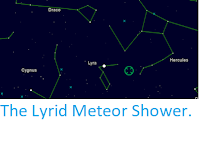Asteroid 2019 HN3 passed by the Earth at a distance of about 2 471 000
km (6.42 times the average distance between the Earth and the Moon, or 1.65% of the distance between the Earth and the Sun), slightly before 2.40 pm
GMT on Monday 29 April 2019. There was no danger of
the asteroid hitting us, though were it to do so it would have
presented a small threat. 2019 HN3 has an estimated
equivalent
diameter of 30-94 m (i.e. it is estimated that a spherical object
with
the same volume would be 30-94 m in diameter), and an object at the
upper end of this range would be predicted to be capable of
passing through the Earth's
atmosphere relatively intact, impacting the ground directly with an
explosion that would be about 100 times as powerful as the
Hiroshima
bomb. Such an impact would result in an impact crater over almost a kilometre
in
diameter
and devastation on a wide scale, as well as climatic effects that
could last for years.
Short video made up of five minutes worth of 3.5 second images of 2019 HN3. Mariusz K/Dosięgnąć Gwiazd.
2019 HN3 was discovered on 26 April 2018 (the day before its closest approach to the Earth) by the Zwicky Transient Facility at Palomar Observatory in California. The
designation 2019 HM3 implies that it was the 85th asteroid (asteroid N3 -
in numbering asteroids the letters A-Y, excluding I, are assigned
numbers from 1 to 24, with a number added to the end each time the
alphabet is ended, so that A = 1, A1 = 25, A2 = 49, etc., which means that N3 = 13 + (24 X 3) = 84)
discovered in the seconf half of April 2019 (period 2019 H).
The calculated orbit of 2019 HN3. Minor Planet Center.
2019 HN3 has a 903 day orbital period and an eccentric orbit
tilted at an angle of 9.40° to the plane of the Solar System, which
takes it from 1.01 AU from the Sun (i.e. 101% of he average distance at
which the Earth orbits the Sun) to 2.65 AU from the Sun (i.e. 265% of
the
average distance at which the Earth orbits the Sun, and considerably outside the orbit of the planet Mars). It is therefore
classed as an Amor Group Asteroid (an asteroid which comes close to the
Earth, but which is never closer to the Sun than the Earth is). Close
encounters between the 2019 HN3 and Earth are fairly common, with the
last having happened in June 2014 and the next predicted
in February 2024.
See also...
Follow Sciency Thoughts on Facebook.








